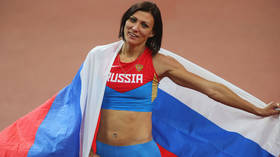Russian runner to be stripped of Olympic gold

Russian athlete Natalya Antyukh will be stripped of the gold medal she won at the 2012 London Olympic Games after being found guilty of doping violations, according to the Athletics Integrity Unit (AIU).
The AIU announced on Monday that Antyukh, 41, would have her results disqualified from the period of July 15, 2012, to June 29, 2013.
The organization said the punishment was due to the use of a “prohibited substance/method” and cited charges based on data from LIMS (laboratory informational management system).
The AIU’s announcement noted that Antyukh had already been sanctioned for alleged doping violations – which resulted in her losing her relay gold medal from the Moscow 2013 World Championships.
“Athlete already serving the maximum 4 year sanction for a 1st violation under the rules and her results from 30 June 2013 until 31 December 2015 are already disqualified. National decision appealable,” read a statement.
Following AIU charges based on LIMS data, Russian athlete Natalia Antyukh has been banned for the use of a Prohibited Substance/Method. DQ results from 15 July 2012 until 29 June 2013.Details here: https://t.co/BnYliFsoMLpic.twitter.com/HOjmF0hAVa
— Athletics Integrity Unit (@aiu_athletics) October 24, 2022
Antyukh finished first in the women’s 400m hurdles at the 2012 London Games, recording a time of 52.70 seconds to beat US rival Lashinda Demus into second. Zuzana Hejnova of the Czech Republic took bronze, while Kaliese Spencer of Jamaica came fourth.
Antyukh was also part of the Russian team which won 4 x 400m relay silver in London, although they were later disqualified due to doping allegations against team member Antonina Krivoshapka.
Prior to that, the St. Petersburg-born Antyukh was a silver medalist in the 4 x 400m relay at the 2004 Athens Games, where she also earned bronze in the 400m individual event.
She later claimed gold in the 4 x 400m relay at the 2005 World Championships in Helsinki. Antyukh formally retired in February 2017.
Russia has faced long-running allegations of state-sponsored doping of athletes, which were presented as part of a 2016 report commissioned by the World Anti-Doping Agency (WADA) and led by Canadian lawyer Richard McLaren.
Many of the claims were based on testimony by doctor Grigory Rodchenkov, the disgraced former head of the Moscow anti-doping laboratory who has since fled Russia for the US.
A warrant has been issued for Rodchenkov’s arrest in Russia on drug-trafficking charges.
Russian officials have admitted mistake were made with some aspects of their anti-doping programs, but have vehemently denied claims of state-backed doping initiatives.
Dozens of Russian athletes who were initially banned following the WADA investigation later had their bans overturned on appeal at the Court of Arbitration for Sport (CAS), which stated there had been insufficient evidence to impose sanctions.
Many Russian athletes were forced to miss the 2016 Rio de Janeiro Olympic Games because of the doping allegations against their country.
The Russian teams at the 2018 PyeongChang Winter Games, 2020 Tokyo Summer Games, and 2022 Beijing Winter Games all competed under neutral status.
Current WADA sanctions against Russia – which were imposed following claims of the manipulation of Moscow laboratory data – are due to end in December of this year.
The Russian Anti-Doping Agency (RUSADA) has been following a roadmap towards being declared “fully complaint” with the WADA Code.













